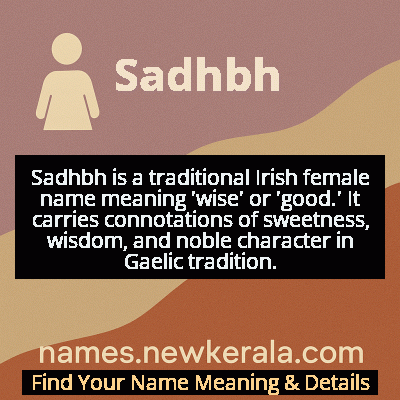Sadhbh Name Meaning & Details
Origin, Popularity, Numerology Analysis & Name Meaning of Sadhbh
Discover the origin, meaning, and cultural significance of the name SADHBH. Delve into its historical roots and explore the lasting impact it has had on communities and traditions.
Name
Sadhbh
Gender
Female
Origin
Irish
Lucky Number
6
Meaning of the Name - Sadhbh
Sadhbh is a traditional Irish female name meaning 'wise' or 'good.' It carries connotations of sweetness, wisdom, and noble character in Gaelic tradition.
Sadhbh - Complete Numerology Analysis
Your Numerology Number
Based on Pythagorean Numerology System
Ruling Planet
Venus
Positive Nature
Harmonious, responsible, caring, and artistic.
Negative Traits
Overly idealistic, superficial, possessive, or jealous.
Lucky Colours
Pink, turquoise.
Lucky Days
Friday.
Lucky Stones
Diamond, turquoise.
Harmony Numbers
2, 3, 9.
Best Suited Professions
Artists, musicians, teachers, healthcare workers.
What People Like About You
Warmth, nurturing nature, artistic flair.
Famous People Named Sadhbh
Sadhbh
Mythological Queen
Wife of Fionn mac Cumhaill and mother of Oisín in the Fenian Cycle
Sadhbh Ní Fhaoláin
Poet and Writer
Prominent Irish language poet and cultural preservationist
Sadhbh O'Neill
Environmental Activist
Climate policy researcher and sustainable development advocate
Sadhbh Baxter
Traditional Musician
Award-winning sean-nós singer and Irish harpist
Name Variations & International Equivalents
Click on blue names to explore their detailed meanings. Gray names with will be available soon.
Cultural & Historical Significance
The name's cultural significance extends beyond mythology into the realm of Irish identity preservation. During periods of English cultural domination, names like Sadhbh served as quiet acts of cultural resistance, maintaining Gaelic linguistic and cultural traditions. In modern Ireland, the name has become emblematic of the Celtic Revival movement, representing a reconnection with pre-colonial Irish identity. Its continued usage reflects the ongoing importance of mythological archetypes in contemporary Irish society and the value placed on names that carry deep historical and cultural resonance.
Extended Personality Analysis
Those bearing the name Sadhbh are typically characterized by a profound inner wisdom that manifests as exceptional judgment and perspective. They possess a natural ability to see beyond surface appearances, understanding people and situations with remarkable depth and clarity. This intuitive wisdom is complemented by strong emotional intelligence, allowing Sadhbhs to navigate complex interpersonal dynamics with grace and effectiveness. Their quiet confidence often makes them natural leaders, though they typically lead through inspiration rather than authority, preferring to empower others rather than command them.
Sadhbhs are known for their balanced nature, combining traditional values with progressive thinking in ways that feel both grounded and innovative. They exhibit remarkable resilience in facing challenges, drawing strength from their deep connection to personal values and cultural heritage. Their creative expression often takes unconventional forms, whether in artistic pursuits, problem-solving, or relationship-building. While they can be private individuals, those who earn their trust find loyal, insightful companions who offer wisdom without judgment and support without condition. The name seems to carry an expectation of emotional maturity and intellectual depth that most who bear it naturally fulfill.
Modern Usage & Popularity
In contemporary times, Sadhbh has experienced a notable resurgence as part of the broader Celtic naming revival that began in the late 20th century. While it remains most popular in Ireland, particularly in Gaeltacht regions and among Irish-speaking families, its usage has expanded to Irish diaspora communities worldwide. The name's popularity reflects growing pride in Irish cultural heritage and the increasing normalization of traditional Gaelic names in English-speaking countries. Despite pronunciation challenges for non-Irish speakers (typically rendered as 'Sive'), the name's distinctive quality and deep cultural resonance have contributed to its steady popularity. Current naming trends show Sadhbh maintaining a consistent presence without becoming overly common, striking a balance between tradition and individuality that appeals to modern parents seeking meaningful names with cultural depth.
Symbolic & Spiritual Meanings
Symbolically, Sadhbh represents the profound connection between human wisdom and natural intuition that characterizes Celtic spiritual traditions. The name's mythological associations with transformation—specifically the deer-to-human metamorphosis—symbolize the journey from instinctual being to conscious wisdom, embodying the Celtic belief in the sacredness of all life forms and their interconnectedness. This transformation narrative also represents personal growth and the realization of one's true potential after overcoming enchantment or limitation. The deer symbolism connects Sadhbh to themes of gentleness, vigilance, and the ability to move gracefully through life's challenges while maintaining spiritual purity. In broader metaphorical terms, the name signifies the integration of ancient wisdom with contemporary consciousness, serving as a bridge between traditional values and modern understanding that remains relevant across generations.

